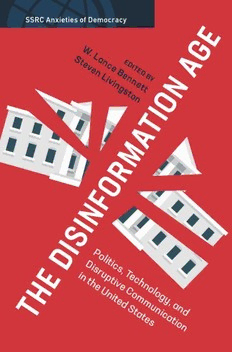
The Disinformation Age: Politics, Technology, And Disruptive Communication In The United States PDF
Preview The Disinformation Age: Politics, Technology, And Disruptive Communication In The United States
E G W. A L S a t n E eve ce DITE n LiviBennD BY N n et gs t O t o n I T A M R O F N I S I D P oli ti E Disr cs, i u T H n t pti ec h v h e U e C nol T nited ommuogy, a Sta nic nd t a es ti o n TheDisinformationAge The intentional spread of falsehoods – and attendant attacks on minorities, press freedoms, and the rule of law – challenge the basic norms and values upon which institutional legitimacy and political stability depend. How did we get here? The Disinformation Age assembles a remarkable group of historians, political scientists, and communicationscholarstoexaminethehistoricalandpoliticalorigins ofthepost-factinformationera,focusingontheUnitedStatesbutwith lessonsforotherdemocracies.BennettandLivingstonframethebook byexaminingdecades-longeffortsbypoliticalandbusinessintereststo undermineauthoritativeinstitutions,includingparties,elections,public agencies,science,independentjournalism,andcivilsocietygroups.The otherdistinguishedscholarsexplorethehistoricaloriginsandworkings of disinformation, along with policy challenges and the role of the legacy press in improving public communication. This title is also availableasOpenAccessonCambridgeCore. W. Lance Bennett is Professor of Political Science and Ruddick C. Lawrence Professor of Communication at the University of Washington. The focus of his work is how communication affects democraticlife.HehasheldvisitingprofessorshipsatHarvard,Uppsala, Stockholm,andFreeUniversityBerlin.Inadditiontohonorarydoctorates fromUppsalaandBern,hehasreceivedcareerachievementawardsfrom the American Political Science Association, the International Communication Association, and the US National Communication Association. His publications include The Logic of Connective Action: Digital Media and the Personalization of Contentious Politics (with AlexandraSegerberg,CambridgeUniversityPress,2013). Steven Livingston is Professor of Media and Public Affairs and International Affairs with appointments in the School of Media and Public Affairs (SMPA) and the Elliott School of International Affairs (ESIA) at George Washington University. He is also the founding directoroftheInstituteforData,Democracy,andPolitics(IDDP).He hasheldvisitingprofessorshipsandfellowshipsatHarvardUniversity, theUniversityofCambridge,theFreeUniversityinBerlin,Canterbury UniversityinNewZealand,St.GalenUniversityinSwitzerland,andthe BrookingsInstitution. Sponsored by the Social Science Research Council The Social Science Research Council (SSRC) is an independent, international, nonprofit organization driven by its mission to mobilize social science for the public good. Founded in 1923, the SSRC fosters innovativeresearch,nurturesnewgenerationsofsocialscientists,deepens how inquiry is practiced within and across disciplines, and amplifies necessaryknowledgeonimportantpublicissues. TheSSRCisguidedbythebeliefthatjustice,prosperity,anddemocracy all require better understanding of complex social, cultural, economic, and political processes. We work with practitioners, policymakers, and academic researchers in the social sciences, related professions, and the humanities and natural sciences. We build interdisciplinary and internationalnetworks,working withpartners aroundtheworldtolink research to practice and policy, strengthen individual and institutional capacitiesforlearning,andenhancepublicaccesstoinformation. SSRCAnxietiesofDemocracy Editors JohnA.Ferejohn,NewYorkUniversity IraKatznelson,ColumbiaUniversity DeborahJ.Yashar,PrincetonUniversity Withliberaldemocraciesafflictedbydoubtanddisquiet,thisseriesprobessourcesof current apprehensions and explores how such regimes might thrive. What array of pressures most stresses democratic ideas and institutions? Which responses might strengthen these regimes and help them flourish? Embedded in the Social Science ResearchCouncil’sprogramon“AnxietiesofDemocracy,”theseriesfocusesonhow representativeinstitutions–includingelections,legislatures,politicalparties,thepress andmassmedia,interestgroups,socialmovements,andpolicyorganizations–orient participation,learning,andaccountability.Thevolumesintheseriesfurtheraskhow particular policy challenges shape the character of democratic institutions and collective actors, and affect their capacity to address large problems in the public interest. These challenges include, but are not limited to: (1) designing democratic institutions to perform successfully under conditions of social and political polarization; (2) managing and orienting contemporary capitalism and alleviating hierarchies of inequality; (3) addressing questions of membership, including populationmovementsanddifferentiatedcitizenship;(4)choosingpoliciestobalance nationalsecurityandcivilliberty;(5)exploringtheeffectsofglobalclimateoncitizens andthehumanimpactontheenvironment;(6)managingthedevelopmentofmedia and information technologies to ensure they enhance, rather than degrade, robust pluralismandcivilpoliticalengagement. OtherBooksintheSeries CanAmericaGovernItself?FrancesE.LeeandNolanMcCarty SocialMediaandDemocracy:TheStateoftheField,ProspectsforReformNathaniel PersilyandJoshuaA.Tucker WhoGetsWhat?TheNewPoliticsofInsecurityFrancesRosenbluthandMargaret Weir The Disinformation Age Politics, Technology, and Disruptive Communication in the United States Edited by W. LANCE BENNETT UniversityofWashington STEVEN LIVINGSTON GeorgeWashingtonUniversity UniversityPrintingHouse,Cambridgecb28bs,UnitedKingdom OneLibertyPlaza,20thFloor,NewYork,ny10006,USA 477WilliamstownRoad,PortMelbourne,vic3207,Australia 314–321,3rdFloor,Plot3,SplendorForum,JasolaDistrictCentre, NewDelhi–110025,India 79AnsonRoad,#06–04/06,Singapore079906 CambridgeUniversityPressispartoftheUniversityofCambridge. ItfurtherstheUniversity’smissionbydisseminatingknowledgeinthepursuitof education,learning,andresearchatthehighestinternationallevelsofexcellence. www.cambridge.org Informationonthistitle:www.cambridge.org/9781108843058 doi:10.1017/9781108914628 ©CambridgeUniversityPress2021 Thispublicationisincopyright.Subjecttostatutoryexception andtotheprovisionsofrelevantcollectivelicensingagreements, noreproductionofanypartmaytakeplacewithoutthewritten permissionofCambridgeUniversityPress. Anonlineversionofthisworkispublishedatdoi.org/10.1017/9781108914628undera CreativeCommonsOpenAccesslicenseCC-BYwhichpermitsre-use,distributionand reproductioninanymediumforanypurposeprovidingappropriatecredittotheoriginalwork isgiven,anychangesmadeareindicated.Toviewacopyofthislicense,visit https://creativecommons.org/licenses/by/4.0 Allversionsofthisworkmaycontaincontentreproducedunderlicensefromthirdparties. Permissiontoreproducethisthird-partycontentmustbeobtainedfromthesethird-parties directly. Whencitingthiswork,pleaseincludeareferencetothedoi10.1017/9781108914628 Firstpublished2021 AcataloguerecordforthispublicationisavailablefromtheBritishLibrary. LibraryofCongressCataloging-in-PublicationData names:Bennett,W.Lance,editor.|Livingston,Steven(Writeronpublicaffairs),editor. title:Thedisinformationage:politics,technology,anddisruptivecommunicationin theUnitedStates/editedbyW.LanceBennett,UniversityofWashington,Steven Livingston,GeorgeWashingtonUniversity. description:NewYork,NY:CambridgeUniversityPress,2021.|Series:SSRC anxietiesofdemocracy identifiers:lccn2020024234|isbn9781108843058(hardback)|isbn 9781108914628(ebook) subjects:lcsh:Communicationinpolitics–UnitedStates.|Disinformation–UnitedStates. classification:lccja85.2.u6d572020|ddc320.97301/4–dc23 LCrecordavailableathttps://lccn.loc.gov/2020024234 isbn978-1-108-84305-8Hardback isbn978-1-108-82378-4Paperback CambridgeUniversityPresshasnoresponsibilityforthepersistenceoraccuracyof URLsforexternalorthird-partyinternetwebsitesreferredtointhispublication anddoesnotguaranteethatanycontentonsuchwebsitesis,orwillremain, accurateorappropriate. Contents ListofContributors pageix Preface:TheOriginsandImportanceofPolitical Disinformation xv Acknowledgments xxvi part i: disinformation in political and historical context 1 ABriefHistoryoftheDisinformationAge:Information WarsandtheDeclineofInstitutionalAuthority W.LanceBennettandStevenLivingston 3 part ii: the current situation 2 APoliticalEconomyoftheOriginsofAsymmetric PropagandainAmericanMedia YochaiBenkler 43 3 TheFloodedZone:HowWeBecameMoreVulnerableto DisinformationintheDigitalEra PaulStarr 67 part iii: historical roots of disinformation 4 HowAmericanBusinessmenMadeUsBelievethatFree EnterprisewasIndivisiblefromAmericanDemocracy: TheNationalAssociationofManufacturers’Propaganda Campaign1935–1940 NaomiOreskes,ErikM.Conway,andCharlieTyson 95 vii viii Contents 5 “SinceWeAreGreatlyOutnumbered”:WhyandHow theKochNetworkUsesDisinformation toThwartDemocracy NancyMacLean 120 part iv: the policy problem 6 HowDigitalDisinformationTurnedDangerous DaveKarpf 153 7 PolicyLessonsfromFiveHistoricalPatternsinInformation Manipulation HeidiTworek 169 8 WhyItIsSoDifficulttoRegulateDisinformationOnline BenEpstein 190 part v: the role of public broadcasting 9 USPublicBroadcasting:ABulwarkagainstDisinformation? PatriciaAufderheide 213 10 ThePublicMediaOption:ConfrontingPolicyFailure inanAgeofMisinformation VictorPickard 238 conclusion: defending democracy in the disinformation age 11 TheCoordinatedAttackonAuthoritativeInstitutions: DefendingDemocracyintheDisinformationAge W.LanceBennettandStevenLivingston 261
